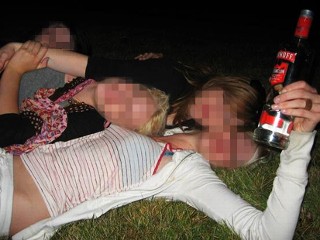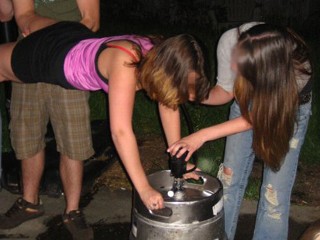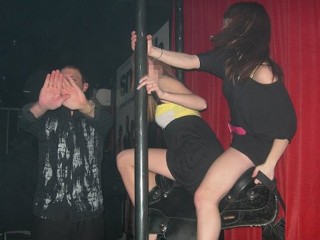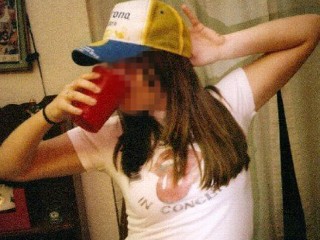Drunken College Girls Immortalize Their Nights on Facebook
A growing number of young women are posting images of their debauchery online.
LONDON, February 19, 2008 -- When is it time to say no to the next tequila slammer?
How about this? "You've already had a couple of bottles of Chardonnay over dinner, your make-up is smeared all over your face" (#18).
Or this? "You've become convinced that dancing with your arms overhead, shaking your ass, and yelling WOO HOO is truly the sexiest dance move EVER" (#3).
Does this all sound too familiar?
Well, this is advice from a (tongue-in-cheek) list of "30 reasons girls should call it a night," a very popular Facebook group with almost 180,000 members.
Here viewers can find 5,000 photos of girls in states of drunken debauchery: vomiting, inadvertently flashing their underwear, passed out in a bush, or answering a call of nature — outside.
It appears that drunken antics are no longer a source of acute embarrassment for girls; in fact boasting to the world on social networking sites is a way to gain social standing among one's peers.

However, there are double standards involved when you fall on the wrong side of the gender divide, as group moderator Jasmine Kalimullah, a communications major at SUNY College at Oneonta, explained to ABC News.
"I don't know why it is acceptable for guys to drink and not females," she said. "Possibly because boys have always been expected to be mischievous, so when they drink and act out, they are just boys being boys. Females, on the other hand, are supposed to be dainty and ladylike.

"Is it changing?" she asked. "I really don't know, I hope it is changing. I think it's unfair to have a double standard."
Lady Lushes Becoming More Common?
However, so commonplace are drunken girls that the Oxford English Dictionary found it necessary in 2001 to include the newly coined noun "ladette", which describes a "boisterous, heavy-drinking young woman; a young woman with a lifestyle that is more characteristic of that of some young men, usually involving heavy drinking and boisterous behavior."
Amanda Simpson, from the University of Colorado at Colorado Springs, told the "Stop making fools of yourselves!" discussion group that she has no problem with those drinking to excess, but that she does take issue with advertising one's drunken stupidity.

"I drink, I party, I live it up," Simpson wrote in a post to the group. "I do NOT, however, take photos of myself in drunken, compromising positions and then plaster them on public internet forums where any %*$?!^% off the street may see them, including, but not limited to: Parents, Bosses, Potential employers, grad school or college admissions staff, Internship directors."
Provocative Photos May Mean Professional Suicide
But many photos on the site are accompanied by full names and the colleges they attend, showing a blatant disregard for the fact that potential employers could be viewing their drunken exploits.
A study by the networking firm Viadeo recently found that one in five employers now uses social networking Web sites, such as Facebook and MySpace, to research information on job candidates and to view how they project themselves. Almost two thirds said their recruitment decisions were influenced by the contents of an individual's profile, while a quarter said that they had changed their mind and decided not to hire someone because of what they found online.

Graduates at Yale University are being warned that keeping what may be considered a "cool" profile on Facebook could cost you your next job. Philip Jones, director of Yale's undergraduate career services, told ABC News that he advises graduates to clean up their profiles. "We've seen the results of not doing it, and shared our war stories with students," he said.
Doctors: Behaviors Could Be Dangerous
Although it may seem to some like good clean fun, many doctors are far from convinced of any merits to the site. They believe it is making fun of a very real problem facing not only college girls but women or men of any age.

"Brain damage, trauma injuries and the increased risk of infection by sexually transmitted diseases are long-term consequences of binge drinking," Dr. Fulton T. Crews, professor of pharmacology and psychiatry at the University of North Carolina in Chapel Hill, told ABC News. "Education on responsible drinking and healthy life habits are important to help young individuals avoid these long-term consequences."
Data from several national surveys indicate that about half of college drinkers engage in heavy episodic consumption. Binge drinking is typically defined as consuming five or more drinks in a row for men, four or more for women.

About 1,700 college students between the ages of 18 and 24 die each year from unintentional alcohol-related injuries, including motor vehicle crashes. And more than 97,000 students between the ages of 18 and 24 are victims of alcohol-related sexual assault or date rape, according to the American Psychiatric Association.
So that "30 reasons" list may provide friendly advice for those who need to be told when to call it a night.